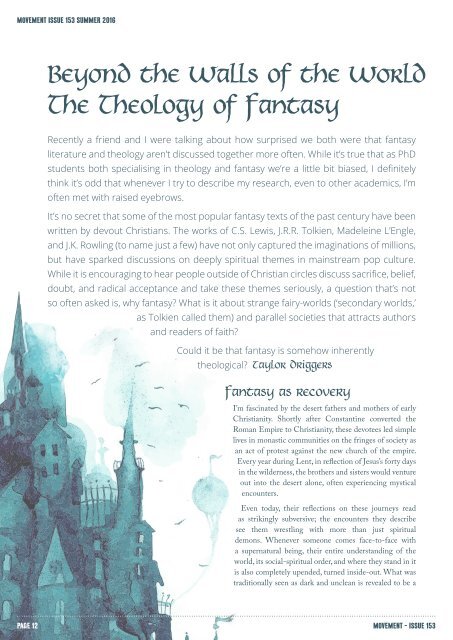Movement-153
You also want an ePaper? Increase the reach of your titles
YUMPU automatically turns print PDFs into web optimized ePapers that Google loves.
<strong>Movement</strong> Issue <strong>153</strong> summer 2016<br />
Beyond the Walls of the World<br />
The Theology of Fantasy<br />
Recently a friend and I were talking about how surprised we both were that fantasy<br />
literature and theology aren’t discussed together more often. While it’s true that as PhD<br />
students both specialising in theology and fantasy we’re a little bit biased, I definitely<br />
think it’s odd that whenever I try to describe my research, even to other academics, I’m<br />
often met with raised eyebrows.<br />
It’s no secret that some of the most popular fantasy texts of the past century have been<br />
written by devout Christians. The works of C.S. Lewis, J.R.R. Tolkien, Madeleine L’Engle,<br />
and J.K. Rowling (to name just a few) have not only captured the imaginations of millions,<br />
but have sparked discussions on deeply spiritual themes in mainstream pop culture.<br />
While it is encouraging to hear people outside of Christian circles discuss sacrifice, belief,<br />
doubt, and radical acceptance and take these themes seriously, a question that’s not<br />
so often asked is, why fantasy? What is it about strange fairy-worlds (‘secondary worlds,’<br />
as Tolkien called them) and parallel societies that attracts authors<br />
and readers of faith?<br />
Could it be that fantasy is somehow inherently<br />
theological? Taylor Driggers<br />
Fantasy as recovery<br />
I’m fascinated by the desert fathers and mothers of early<br />
Christianity. Shortly after Constantine converted the<br />
Roman Empire to Christianity, these devotees led simple<br />
lives in monastic communities on the fringes of society as<br />
an act of protest against the new church of the empire.<br />
Every year during Lent, in reflection of Jesus’s forty days<br />
in the wilderness, the brothers and sisters would venture<br />
out into the desert alone, often experiencing mystical<br />
encounters.<br />
Even today, their reflections on these journeys read<br />
as strikingly subversive; the encounters they describe<br />
see them wrestling with more than just spiritual<br />
demons. Whenever someone comes face-to-face with<br />
a supernatural being, their entire understanding of the<br />
world, its social-spiritual order, and where they stand in it<br />
is also completely upended, turned inside-out. What was<br />
traditionally seen as dark and unclean is revealed to be a

















